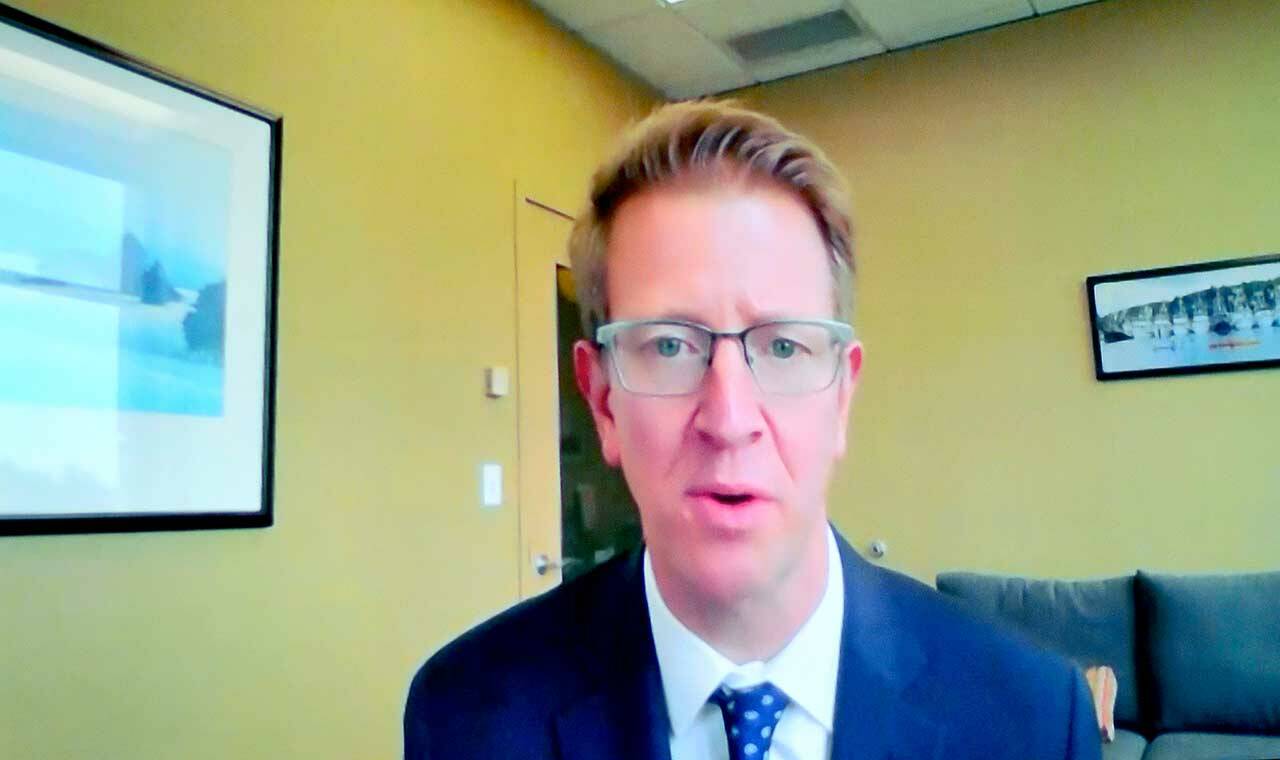PORT TOWNSEND — The “fix Congress committee,” rural broadband access and an extension of the child tax credit were all topics in U.S. Rep. Derek Kilmer’s Zoom meeting with The Chamber of Jefferson County.
Kilmer, whose 6th Congressional District includes the North Olympic Peninsula, spoke Friday with chamber Executive Director Arlene Alen.
Alen thanked the Democrat from Gig Harbor for the live meeting, acknowledging that, “It’s crazy in Washington [D.C.],” while “it’s equally crazy in this Washington, too.”
Kilmer began by saying he’s spoken with far too many people who’ve lost a loved one to COVID-19. He cited a new statistic: one in every 500 U.S. residents has died as a consequence of the coronavirus.
Severe COVID can be avoided through vaccination, Kilmer said, adding that more than 380 million doses have been given in this nation.
“I want to shift gears,” he said next.
Infrastructure
“It is likely, before the end of the month, you’ll see a vote on the nation’s infrastructure bill,” aimed at funding roads, bridges, sewers and broadband internet access.
As Congress grapples with the Build Back Better Act, Kilmer said, one of the measures under consideration is an extension of the child tax credit enacted earlier this year.
It’s expected to cut child poverty in half, he said, and there’s an opportunity now to renew the tax credit and keep that trend going.
The proposed infrastructure legislation, Kilmer added, would provide flexible, long-term assistance to “persistently distressed communities,” such as those on the Peninsula. That funding would be directed toward job creation, especially in industries that address the climate crisis, he said.
Yet Kilmer admitted that Congress, all too often, is ineffectual.
“Our capacity to make a lot of progress is currently stymied,” he said, by “broken politics.”
To try to make repairs, Kilmer chairs the bipartisan Select Committee on Modernization of Congress, aka the “fix Congress committee.”
An attendee asked what can be done to heal the bitter divides afflicting Congress — and places such as Port Townsend.
“The seas are really rocky. It’s really difficult if 40 percent of the oars are rowing one way and 40 percent of the oars are rowing other way, and 20 percent are out of the water, actively beating everybody else over the head,” Kilmer acknowledged.
“How do we work together more? We did a hearing on this subject,” available on C-SPAN, that included guest speaker Amanda Ripley, author of “High Conflict: Why We Get Trapped and How We Get Out.”
She differentiates “good” conflict from “high” conflict, which Kilmer said is conflict that serves only itself.
The adversaries spend “too much time just duking it out,” Kilmer said.
Collaborative culture
One way to foster a healthier workplace, Kilmer said, is to set a collaborative culture from the start.
“That is absolutely something that has been broken in Congress,” where a new-member orientation puts Democrats on one bus and Republicans on the other.
“It is tribal from the beginning,” said Kilmer, adding that the fix Congress committee’s recommendation on this was simply “Stop doing that!”
In their hearing, committee members sit at a round table instead of on a dais; they don’t “do the five-minute speechifying,” Kilmer said.
He doesn’t often recommend books because of the time commitment they require. But “High Conflict,” he believes, should be mandatory reading for every American right now.
After Kilmer’s half-hour talk, Alen told viewers about a conflict-related offering to be available to chamber members.
“Look in your inboxes,” she said, “for some great de-escalation training,” for business owners in both Jefferson and Clallam counties.
It will address “how to handle the vax-card checks at your doors,” Alen said.
________
Jefferson County senior reporter Diane Urbani de la Paz can be reached at 360-417-3509 or durbanidelapaz@peninsuladailynews.com.

